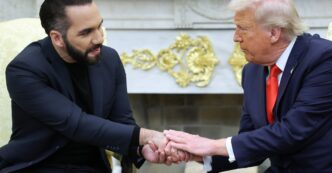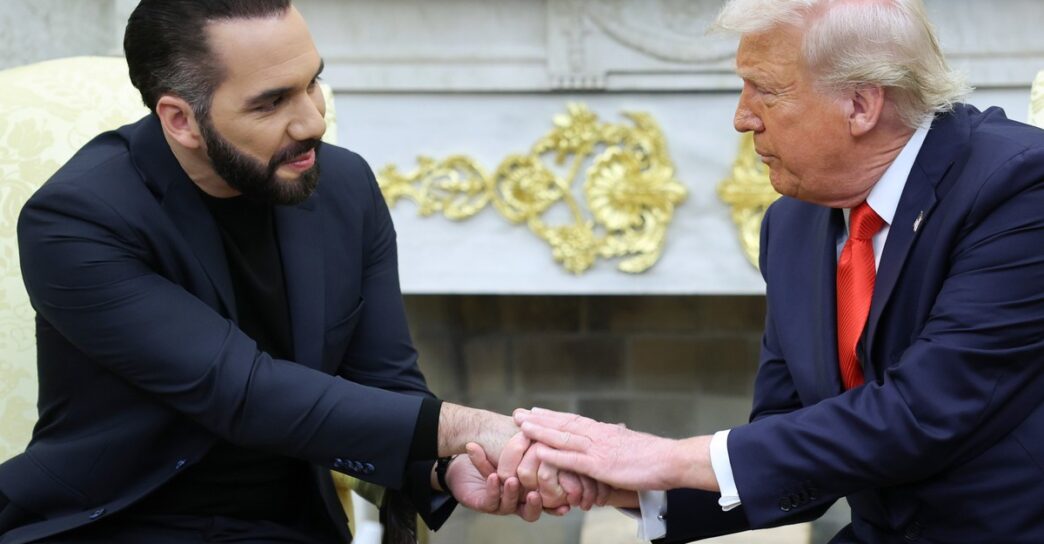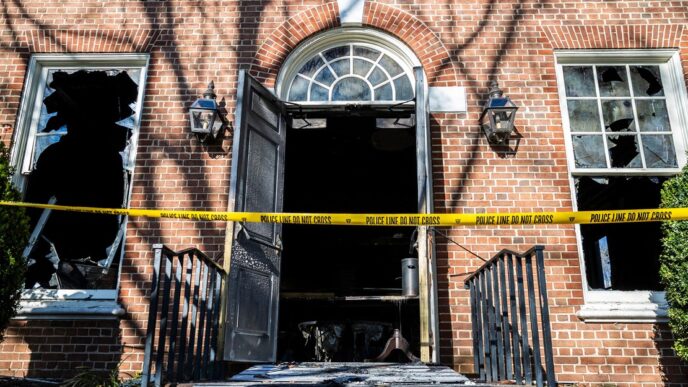This is an edition of The Atlantic Daily, a newsletter that guides you through the biggest stories of the day, helps you discover new ideas, and recommends the best in culture. Sign up for it here.
Donald Trump took one step closer to openly defying an order from the Supreme Court today—effectively daring the justices to defend the law or pack up and go home.
President Nayib Bukele of El Salvador has emerged as a confederate of Trump’s, accepting planes full of Venezuelan citizens removed from the United States. Last month, the U.S. government deported Kilmar Abrego Garcia, a Salvadoran man living in Maryland with protected legal status. As The Atlantic first reported, the Trump administration acknowledged in court that Abrego Garcia’s deportation was “an administrative error”; last week the Supreme Court unanimously ordered the executive branch to “facilitate” his return to the United States.
Since then, the Justice Department has dragged its feet. It has filed required reports to a district court judge late, and has refused to say what it’s doing to bring Abrego Garcia back to the United States. But whether this was defiance or merely delay was unclear until today. In an Oval Office press conference this afternoon, the White House revealed that the answer is defiance—at least for now. Both the U.S. and El Salvador are pretending that they have no power to do anything about Abrego Garcia, a performance of smirking, depraved, and wholly unconvincing absurdity.
U.S. Attorney General Pam Bondi claimed that Abrego Garcia “was illegally in our country,” despite her own department’s earlier admission of error. The Trump administration also alleged that he’s a gang member, based on a dubious 2019 accusation, but has provided no evidence. “That’s up to El Salvador if they want to return him. That’s not up to us,” Bondi said, adding that if Bukele wanted to send him home, America would provide a plane.
Yet Bukele was just as insistent that he was powerless to do anything about a man in a prison he controls. “The question is preposterous,” he said. “How can I smuggle a terrorist into the United States? I don’t have the power to return him to the United States.”
None of this is remotely believable. Bukele wouldn’t have to smuggle Abrego Garcia; Bondi had just said she could send a plane. And the idea that Trump couldn’t insist that the friendly leader of a client state return a single man would be an indictment of his abilities as a head of state—if it were true. One might say this leaves Abrego Garcia in a Kafkaesque limbo, but all reports about the Salvadoran prison, the Centro de Confinamiento del Terrorismo (CECOT), indicate that it’s more of a hell.
American citizens might like to reassure themselves that Abrego Garcia is an outlier case involving a Salvadoran citizen; surely they are insulated from such misfortune. But this would be a failure of imagination. First, as I have written, a government that can ignore court rulings in one sphere can ignore them in others, so no one is safe from a lawless government.
Moreover, an American citizen could find themselves in precisely the same vise as Abrego Garcia. During today’s remarks, Trump was asked whether he would be willing to deport American citizens convicted of violent crime to El Salvador. “I’m all for it,” he said. But convictions are overturned all the time. What would happen if an American citizen was found guilty, sent to CECOT, and then had their conviction overturned? We can guess: The White House would insist that he was in Salvadoran custody, beyond their reach. Bukele would shrug and say he had no power to release them.
Interestingly, Trump kept silent on Abrego Garcia in the Oval Office today, deferring to others—Bondi, his adviser Stephen Miller, and Secretary of State Marco Rubio—to answer questions, while he sat by looking content. Since his inauguration in January, he’s allowed other officials to float the idea of defying court orders while maintaining in public remarks that he will always abide by court rulings.
So will he? His administration is on a collision course with Paula Xinis, the district court judge mandating Abrego Garcia’s return. If Abrego Garcia stays in El Salvador—and Bondi’s claim that the matter is in Bukele’s hands makes it effectively impossible for the Justice Department to comply—the case will surely end up back before the Supreme Court. In their brief, unsigned order about Abrego Garcia last week, the Supreme Court justices seemed to be trying to say as little as possible, and today’s press conference showed how happy the White House has been to take advantage of their brevity and ambiguity. If the Court is unwilling to be more direct, it will surrender any power to act as a check on the other branches of government, thereby allowing authoritarianism.
In an 1832 standoff with the Supreme Court, President Andrew Jackson—a hero of Trump’s—is apocryphally supposed to have said that Chief Justice John Marshall “has made his decision; now let him enforce it!” The quote is famous but fictional; less well known is the fact that Jackson did, ultimately, comply with the court. So have all of his predecessors. Trump is on the brink of breaking that precedent. If he succeeds, he will have broken the bonds of the Constitution as well.














